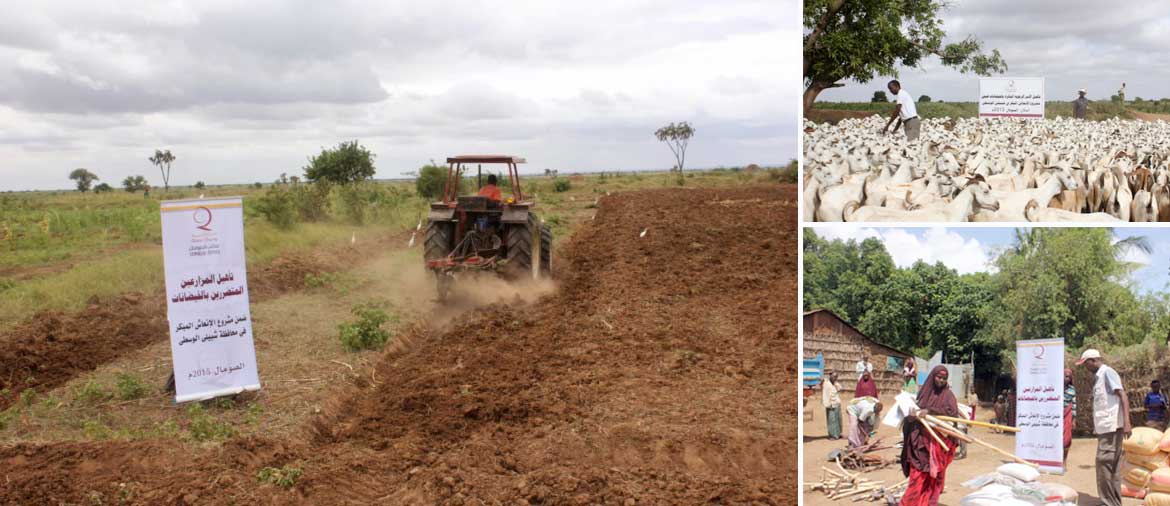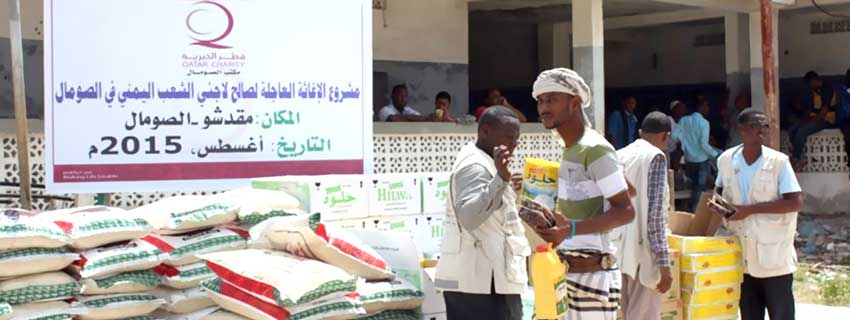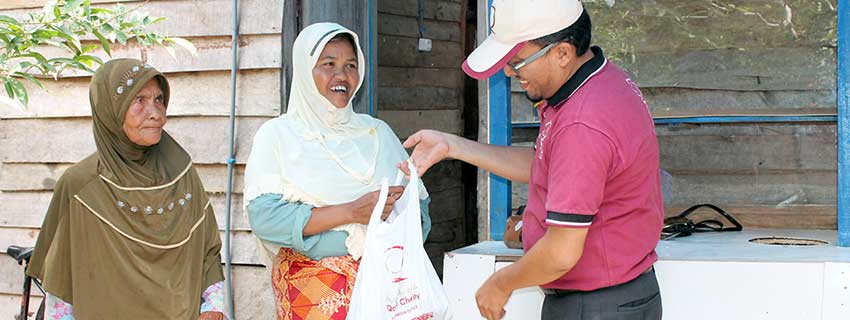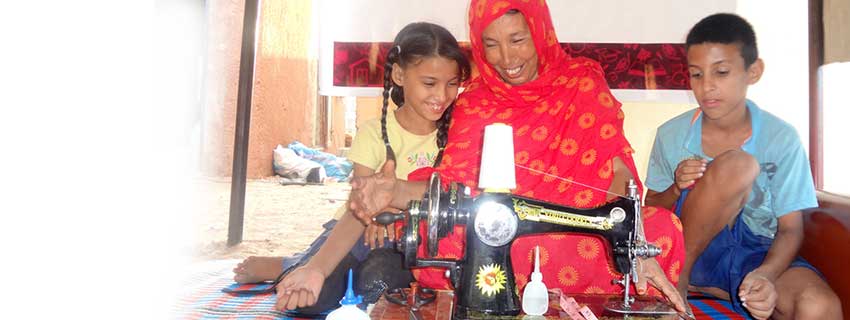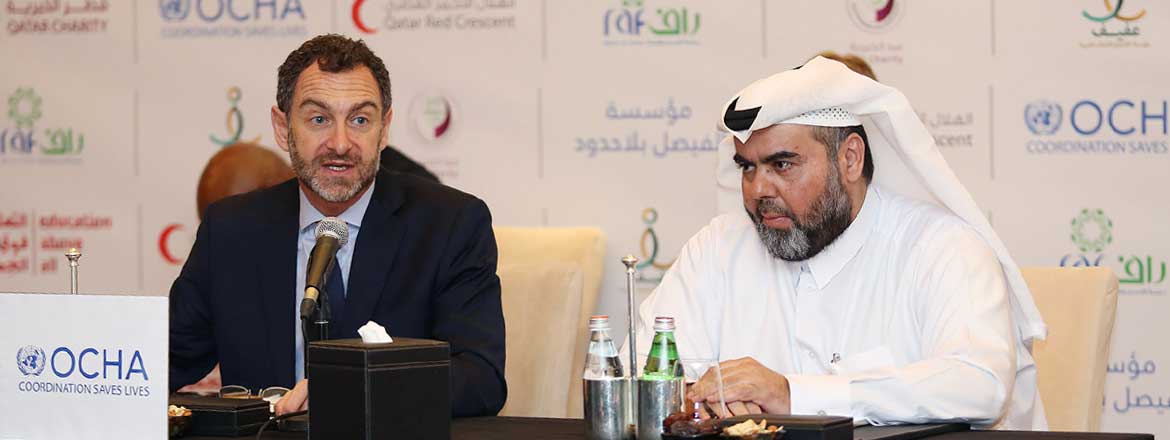Tens of thousands have Iftar on Qatar Charity’s tables in three countries
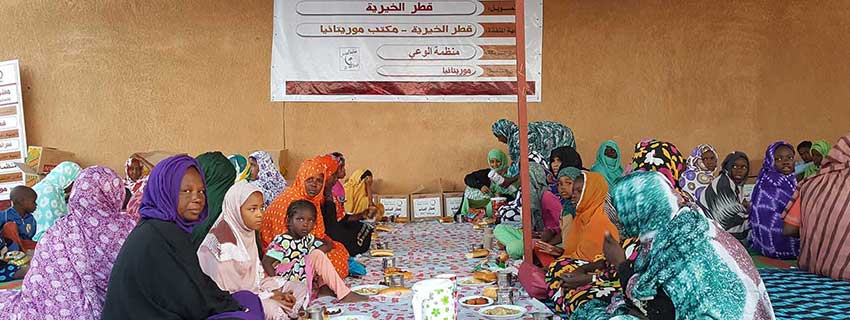
2017-06-08T02:25:01+01:00

As part of its "Give and Shine Through" campaign in 1438H, Qatar Charity continues to organize breakfast and distribute Ramadan food baskets in Mauritania, Kyrgyzstan and Somalia, benefiting tens of thousands of fasting people in these countries.
Those who are sponsored by QC and their families received special attention in the fasting program, where an important part of the program was dedicated to orphans and their families.
Khalid Abdullah Al Yafei, Director of Operations Department, stated, "QC has been keen to focus on disaster-affected groups such as in Somalia due to drought, remote rural areas as in Mauritania and the poorest groups in Kyrgyzstan.” He thanked the donors in Qatar who have been credited for supporting the people of those countries.
Mauritania
In Mauritania, QC has provided more than 31,000 ready-to-eat meals and food baskets that will benefit more than 20,000 fasting people at a cost of around 500,000 QR.
In the Mauritanian capital Nouakchott and various areas of Mauritanian interior, Iftar meals and food baskets were distributed. Moreover, QC’s office benefited from the experience of organizing a Ramadan tent in the past two years and increased the number to 3 tents, erected in the most densely populated areas of the capital, allowing hundreds of fasting people to take advantage of the tents of QC.
Specific increase
The Director of QC’s office in Mauritania, Mr. Idris Al-Sahel, assured the importance of reaching many remote areas that benefited from the fasting program this year, such as Hodh Ech Chargui, the Far East of Mauritania and Tiris Zemmour in the north-most, in addition to the south and center areas in Trarza and Brakna Regions. Besides, partners have been expanded to reach as many needy people as possible, drawing on the expertise of local partners.
Kyrgyzstan
Starting with the capital and other areas in Kyrgyzstan, QC, as part of the fasting program, distributed food baskets in different regions of Kyrgyzstan to 1307 families from the sponsored families of orphans. Thus, the total number of beneficiaries of the fasting program will be 6,500 people.
The Iftar dining tables were accompanied with generous local donations. That is, in the central mosque, 2,000 Iftar hot meals are offered daily by a donation from the Qatari benefactors.
After receiving the Ramadan baskets, the mothers of the beneficiary families sent a thank-you message to the benefactors in Qatar for their support to their Muslim brothers in Kyrgyzstan and for their sponsorship of the orphans who found in QC a substitute for the parents.
Somalia
QC’s office in Somalia has also organized group Iftar Dining Tables for thousands of Somalis in different parts of Somalia, particularly Hargeisa, Bosaso, and Mogadishu, where the number of people displaced by drought in villages and towns is increasing.
The fasting breakfast program in Somalia included distributing ready meals to 500 needy families in Mogadishu, as well as organizing a group breakfast event for 200 students sponsored by QC in Somalia. In addition, Mr. Abdulhakim Hassan Ashkir, State Minister for Awqaf and Religious Affairs, and the Undersecretary of the Ministry of Higher Education, Mr. Ismail Yusuf Hassan, participated in the event.
The Minister of Awqaf and Religious Affairs of Somalia praised the efforts of the benefactors in Qatar, their generosity and their lasting sympathy with Somalia, stressing the importance of the group Iftar especially for students.
Related News
QC Implements Tens of Qualitat
- Hundreds of goats were distributed to the people to help them start over.
- Tens of hectares were restored for 250 families whose lands had been flooded.
As part of its early relief program to the victims of floods in the Middle Shebelle governorate in Somalia, QC implemented qualitative income-generating projects from which 400 families of the same governorate benefited.
Rehabilitation:
The projects included rehabilitation of the affected families and improvement of their life quality, in addition to supporting agriculture and shepherding. The program also included funding income-generating projects. For example, 750 goats were distributed to 150 families. Each family received 5 goats. This project was to enable them to get their ordinary lives back after the floods. The project also aimed at supporting shepherding and providing these families with a source of income that matched their previous professions.
QC has also restored agricultural lands in a total area of 250 hectares for 250 families who had worked in farming before the floods damaged their lands.
QC seeks to rehabilitate the agricultural and shepherding societies and start agricultural and shepherding businesses by supplying the workers with seeds and pesticides as well as manual cultivation instruments needed for local production. QC also helps them in their farmland restoration, and irrigation canals’ reformation. The program also supplied them with some cattle.
Terrible Immigration
The regions adjacent to the two rivers of Shebelle and Juba witnessed heavy rains in last October and November which led to the flooding of the rivers and caused a disastrous immigration of the inhabitants of the rivers’ banks. Middle Shebelle was mostly affected as most irrigation canals and flood control systems were damaged along the Shebelle River by these floods. Reports show that about 10,000 of the local inhabitants left their flooded cities, villages, and farms.
The objective QC had of the early relief project was to reach the local affected community in the governorate as it helped rehabilitate them in their crafts and professions. QC’s goal was to enable them to increase their daily income and enhance their life quality through a number of strategic projects including shops, production machinery, animals, and farmland restoration. This should facilitate their future confrontation to yearly floods. This project also seeks to restore artesian aquifers, reform schools and damaged clinics to help 93,000 people living in the region.
Tens of Thousands Beneficiaries
It is worth mentioning that QC has recently implemented various projects in Somalia including education, health, building mosques, and funding income-generating projects. Tens of thousands of Somalis around Somalia benefited from these projects. Of its construction projects in Puntland, QC inaugurated the reformation of 2 health centers and 2 preliminary schools at a cost of about 292,000 QR.
QC inaugurated the opening of 9 mosques, and 8 centers for memorization of Qur’an in 3 provinces in the north of Somalia: 3 mosques in the coastal province, 3 others in Burco, 1 in Awdal, and 2 in Hiran and Banaadir. It also built 8 centers for Qur’an memorization in Hiran, Banaadir, and Hargeisa. Thousands of Somalis shall benefit from these mosques and centers.
QC office in Somalia has also organized events of distributing sewing machines to 65 productive families in Mogadishu and Hargeisa city in Somaliland in cooperation with Jedoon Association for Woman and Child Development in Hargeisa and HINNA association in Mogadishu.
You can donate to support such projects through the link: Click here
QC Implements Relief Projects
- The aids are sufficient for the refugees and returnees for a month
- Members of the Somali Parliament and Representatives of the Yemeni community contributed in the distribution
Through its office in Somalia and as part of its relief campaign “Yemen, We are With You”, QC implemented an urgent relief project which targeted 600 families of the Yemeni refugees in Somalia and some of the Somali returnees from Yemen who are living in Mogadishu, Hargeisa, and Bosaso.
The food baskets, distributed to the beneficiaries, were sufficient for a whole month. Each family received 25 kg of rice, 25 kg of flour, 15 kg of sugar, 3 liters of cooking oil, 2.5 kg of powder milk, and 2 kg of dates.
Prominent Figures
Many prominent figures took part in the distribution of the aids to the people, including some members of the Somali parliament, and the representatives of the Yemeni community in Somalia. They all commended QC’s role in helping the Yemeni and Somali peoples.
This is one of so many other projects in which QC continues to fulfill its role in aiding and helping others. In addition, QC always makes sure that its beneficiaries are the neediest. The Yemeni people are suffering from a dire crisis which forced the families to emigrate and ask for asylum. This, of course, left the families without any living necessities.
Although Somalia is suffering from hard conditions and security issues, it became one of the countries which received the Yemeni refugees. Therefore, it is now the responsibility of those who work in charity and humanitarian fields to strengthen their efforts so that Somalia does not suffer from a critical condition, too.
130,000 Beneficiaries
130,000 beneficiaries benefited from QC’s continuous campaign ‘Yemen, We Are with You’ since the recent Yemen crisis started and until the end of last May (2015).
The food aid included 17,300 food baskets, 80 tons of flour, and 180 tons of different types of food which were distributed to the different governorates. Furthermore, 3 kitchens were prepared and equipped with foodstuff to provide daily fresh meals for 1,000 persons. Regarding healthcare, the hospitals of Aden, Ma’rib, and Taiz were supplied with some equipment, 100 first-aid bags, and a large amount of medications, and medical disposables.
In addition, 8 water tanks were distributed in Aden with the capacity of 1,000 liters. QC also distributed hundreds of mattresses and blankets to the displaced families there. Another project was funded to clean Aden Municipality in cooperation with its workers.
Call for Help
It is worth mentioning that when the Yemeni crisis started, QC appealed for help to provide 1,260,000 conflict-affected people with food, and medications.
After its appeal and as a first step, QC launched its campaign ‘Yemen, We Are with You’ to collect 36,500,000 QR (10,000,000 USD) to urgently deliver these humanitarian aids to the most affected categories.
QC also supervised the distribution of aids which Qatar sent to the people of Yemen. The aids were delivered through an air bridge from Doha to Djibouti–Ambouli International Airport following the instructions of his highness Sheikh Tamim bin Hamad Al Thani, God bless him. The aids were delivered over two days; there were 4 airplanes which carried 240 tons of different materials.
The aids were received by a delegation of QC which included Mr. Ibrahim Ali Abdullah, QC's Relief Department Director, and Mohammed Wa'i, QC's Office Director in Yemen.
QC’s field team was able to aid many conflict-affected families since the crisis first started in Aden and other Yemeni cities. They provided the families with food, drugs, and medical disposables. They sent the medical supplies to the hospitals so that they would treat the injured. The team also provided the families with food baskets and other basic and necessary items.
You can donate to support such projects through the link: Click here
1,000,000 People Benefit from
- 43,200 conflict-affected in Syria, 4,200 orphans’ families in Gaza, 120,000 people from different countries benefited from ‘Your Sacrifice, their Eid’ campaign
- El Kuwairi: “We thank the Qatari people for donating to our sacrifices project which made the needy of 52 countries the world over happy
Around 1,000,000 people benefited from the sacrifices campaign for the year 1436 AH which QC implemented and called ‘Your Sacrifices, their Eid’ at a cost of around 14,000,000 QR.
Mr. Youssef Bin Ahmed El Kuwairi, QC’s CEO, expressed the relief he felt because the sacrifices project was successful. QC implemented this campaign with the help of its partners in 52 countries from around the world, including Qatar. It was able to make so many needy and low-income families, who could not provide their children with meat, happy.
The affected who suffered from exceptional circumstances were prioritized such as the Syrians inside Syria, the Syrian refugees in the neighboring countries, the Gaza Strip, Yemen, Somalia, etc.
El Kuwairi said, “I am mostly thankful to those who donated for this project in Qatar, and I pray Allah that He accept their good work and reward them. Most certainly, their donations were the reason behind making the needy happy and achieving social teamwork in Qatar.”
QC had already distributed more than 28,300 sacrifices during the season, which meant 500 tons of meat in 52 countries. More than 43,200 families inside Syria benefited from the project. It was implemented in Damascus and its countryside, Idlib and its countryside, Al Rastan, Al Houla and Talbiseh in the countryside of Aleppo, in the countrysides of Hama, of Lattakia, of Daraa, and Quneitra. In addition, 4,200 orphans’ families from the Gaza Strip and 120,000 Somalis benefited from the project.
Other countries in which the project was implemented:
Palestine, the Palestinian camps abroad, Iraq, Jordan, Qatar, Tunisia, Morocco, Lebanon, Sudan, Rwanda, Uganda, Malawi, Burundi, Kenya, Ivory Coast, Djibouti, Tanzania, Mali, Togo, Nepal, India, Chad, Central Africa, Angola, Guinea Bissau, Mauritania, Yemen, Bangladesh, Benin , The Gambia, Namibia, Lesotho, Sri Lanka, Niger, Nigeria, Sierra Leone, Liberia, Congo, South Africa, Ethiopia, Burkina Faso, Senegal, Pakistan, Kyrgyzstan , Indonesia, Kosovo, Comoros Islands, Albania, the Philippines, Ghana, Bosnia, Ethiopia, and Georgia.
QC inaugurated a special campaign for pilgrimage and Eid Al Adha for this year (1436 AH). It included distributing the sacrifices inside and outside Qatar, giving people the chance to perform substitute Hajj, and distributing Eid clothing. Tens of thousands of people will benefit from this project.
The project was also implemented inside Qatar on the third and fourth days of Eid Al Adha. 2,500 sacrifices were distributed from which 12,000 people benefited, including 668 sponsored families with limited income.
Some of the Qatari volunteers helped in the distribution. In addition, QC, for the first time, offered delivery service using refrigerated cars. The sacrifices were given to the beneficiaries at their homes in Khor, Al-Shahaniya, Industrial Area (Sanaiya), and other areas inside Qatar.
This project also targeted the orphans’ and the low-income families, the indebted, the laborers, the divorced, Ramila Hospital’s inpatients, the laborers, courts, the bank, the mail, Al Qahira School, Al Cilia territory, and Abu Hamur territory and the Indian, Egyptian, Yemeni and Philippine communities.
You can donate to support such projects through the link: Click here
QC Offers Income-Generating Pr
- The projects included distributing sewing machines, and holding preparatory courses in sewing and embroidery.
- Fatima bint Al Naji, “QC’s project helped me secure a fixed income to ensure for myself and my family a dignified life without having to need anyone.”
10 disabled female-breadwinners benefited from the income-generating project implemented by QC in Mauritania. It included distributing sewing machines and holding preparatory courses on sewing and embroidery.
QC aims at fighting poverty, especially that among the disabled persons and the breadwinners. This project seeks to provide a fixed income to the beneficiaries through their use of the sewing machines, which were given to them after good training.
The disabilities of the benefiting female-breadwinners varied; some of them were handicapped, and others suffered from partial paralysis.
Many Benefits
The sewing machines were delivered to the disabled women during the honoring ceremony organized by QC in cooperation with Mauritanian Association for Assisting the Handicapped, the partner responsible for the project’s implementation.
Some of the figures who attended this ceremony are: the head of the Handicapped Persons department in the Ministry of Social Affairs, the mayor assistant of Arafat Municipality in Nouakchott, the head of the Mauritanian Association for Assisting the Handicapped, and QC’s director of Social Care department in QC’s office in Mauritania.
Mr. Ahmed wild Wihda, Mayor Assistant, expressed his sincere gratitude for the parties which funded and implemented this project. He also expressed his hope for future similar projects so that more people would benefit from them.
Mr. Jamal wild Abdel Jaleel, Head of the Mauritanian Association for Assisting the Handicapped, said, “This kind of projects funded by QC is very important and essential. It has many benefits: it helps fighting poverty, supporting the disabled, and assisting the breadwinners. Such categories need our help and care.”
The Beneficiaries’ Commendations
After the ceremony was over, the officials distributed the sewing machines to the beneficiaries who expressed their deep joy and happiness. They said that the project was superb because it offered them training and sewing machines and that they now had jobs that could help them bring in a fixed income. This way, they said, they could ensure a dignified life for themselves and their families.
Ms. Fatima bin Al Naji, one of the beneficiaries, said, “I cannot express the amount of happiness I am feeling right now. I thank QC and its local partners and the beneficiaries who funded this project. I hope that this is the beginning of something good. Now that I am done with the training and I got a sewing machine, I think I will now embrace life happily.”
Ms. Adada bint Al Sofi said that she felt ready to start working on the sewing machine she received. She also thanked all the philanthropists who helped fund and implement this important project.
Conventional Bakeries
QC had recently implemented a group of income-generating projects in different cities and villages in Brakna, Mauritania. The projects included 8 conventional bakeries from which around 7,000 people benefited.
The bakeries have rooms for bread and dough. The most appropriate kind of ovens to equip these bakeries with was brick ovens because these areas, where the project was implemented, don’t have electricity and because bricks are found excessively and at great prices. Some of the beneficiaries would even get the bricks themselves. As for the construction of the bakeries, they were built according to modern technologies so that they would not suffer from the problems brick bakeries generally face.
The bakeries were built in several cities and villages in Brakna such as Magta-Lahjar, Sangrafaa, Tachott, Taiba, Al Hoda, and Dutti (which is very far, almost isolated).
These bakeries left great impact on the villagers who could now buy bread at cheap prices and at the quantities they desire. Bread, of course, is essential to most of the villagers – it is part of their food.
You can donate to support such projects through the link: Click here
Qatari Humanitarian Organizati
Al Kuwairi,
"Coordination and cooperation between active humanitarian actors is necessary to offer better services, and humanitarian and development programs to the countries of the Sahel."
Mr. Toby Lanzer,
"We cannot stop the reasons behind the people's needs in Sahel unless we work using a methodology based on security, development and humanitarian work."
As part of the coordination between Qatari Humanitarian Organizations and OCHA, a round table meeting was held in Doha about humanitarian work in the African countries of the Sahel. Its main objectives were to review the work of the humanitarian actors, to discuss the possible cooperation, and to build partnerships in the countries of the Sahel considering the exacerbating conditions of such countries.
Mr. Toby Lanzer, the United Nations Assistant Secretary-General and Regional Humanitarian Coordinator for the Sahel, and the representatives of Qatari humanitarian societies and institutions attended the meeting. The Qatari organizations included: Qatar Red Crescent, Qatar Charity, Sheikh Eid Charity, Sheikh Thani bin Abdallah for Humanitarian Services (RAF), Al Faisal Foundation, Afif Foundation, Education Above All and Silatech. All the Qatari humanitarian organizations active in the Sahel displayed their achievements there through presentations.
At the beginning of the meeting, Mr. Youssef bin Ahmed Al Kuwairi, QC's CEO, thanked all the people who attended the meeting which discussed a very important region in Africa. The Sahel includes a group of countries where Qatari charity organizations are active.
"QC pays extra attention to this region when it implements its humanitarian projects and programs. It is clear through the fact that we have 5 headquarters in Chad, Niger, Mali, Burkina Faso and Mauritania. Through its international and local partners, QC works in the 11 countries of the Sahel," said he.
As he also mentioned, in the last 3 years QC implemented more than 6,000 projects at a cost of around 148,000,000 QR covering most of the sectors. QC is still implementing more projects in the fields of education, health, water, sanitation, food security, livelihoods, economic empowerment and others.
Mr. Al Kuwairi stressed on the importance of cooperating and coordinating with active humanitarian organizations. "Because Qatar Charity believes in its mission and the humanitarian principles of assisting others, it is willing to coordinate and cooperate with all international, regional and local organizations so as to offer humanitarian and developmental programs and services to the countries of the Sahel."
Continuous Crises
Mr. Lanzer said that the exacerbating needs for humanitarian aid are a result of a three dimensional crisis: instability, lack of security, and climate change. "We cannot stop the reasons behind the people's needs in Sahel unless we work using a methodology based on security, development and humanitarian work. The humanitarian actors must always follow up with the deep needs of the countries of the Sahel," said he.
He highlighted the importance of cooperation between the active organizations participating in the development programs to achieve stability. Without such programs, the the need for humanitarian aids will be indefinite.
Mr. Lanzer expressed his gratitude for the Qatari humanitarian organizations and commended their work and efforts. "We thank these organizations for expressing their willingness to cooperate and coordinate. We hope that this meeting will be very successful and that the results will be as great as expected. We also hope it would bring good for the people living in the Sahel."
The work agenda of the round table included exchanging information about the work of Qatari humanitarian organizations in the Sahel, the projects in progress, and the fields they cover. It also covered the chances of cooperation and exchange of partnerships with OCHA, which is covering the humanitarian work in the Sahel. In addition, the meeting was to reinforce coordination mechanisms and exchange of information with the UN.
The African Countries of the Sahel
It is worth mentioning that the Sahel African countries comprise of 9 countries: Chad, Niger, Nigeria, Cameron, Burkina Faso, Mali, Mauritania, Senegal and Gambia. Based on the studies conducted by OCHA, the Sahel is one of the most important places for the main humanitarian operation centers for the year 2016. It is expected that 23,500,000 people might suffer from the lack of security of food, healthcare, severe malnutrition, dire shortage in drinking water, malfunction in sanitation and problems in education. The armed disputes and violence made 4,500,000 people displaced.
Since QC always makes sure to offer the best humanitarian aids, it cooperates with international organizations; especially the United Nations. OCHA and QC have a distinguished relationship especially at the level of coordination.
QC Rehabilitates 7 Artesian Aq
- 24,500 people and tens of thousands of cattle benefit from the project every day in Middle Shebelle which was affected by floods.
- The project helped offer the services of public facilities such as education, health and water in affected territories.
As part of the recovery projects QC is implementing in Somalia, QC's office there finished working on rehabilitating 7 artesian aquifers in Middle Shebelle whose people had suffered from shortages in drinking water. More than 24,500 people and tens of thousands of cattle are expected benefit from the project every day.
Mr. Mohammed Hussein Omar, QC's Office Director in Somalia said, "This rehabilitation project is to resume offered services such as education, health and water. It is mainly to meet the people's need for drinking water. The floods damaged the aquifers causing a dire shortage in drinking water. As a result, many people left their areas. It used to take them hours to reach drinking water."
Based on the conducted field studies, as he mentioned, QC's office rehabilitated the aquifers by increasing their depth and fixing their network pipes. The office equipped the wells with electric engines and pumps. It also built and rehabilitated the tanks and basins for animals to drink from; and generators rooms and storehouses for the wells' equipment.
"In 2013 and 2014, Somalia witnessed many natural disasters. QC implemented this project in order to support the affected families and help them overcome such a humanitarian disaster," said he.
Commendations
QC's office in Somalia thanked the Qatari philanthropists and people residing in Qatar for their great efforts. They reflect the true face of the generous Qatari society. "We offer our help to Somalia in the different fields of shelter, food and medication and others because of our religious and moral bond that connects us to the needy people around the world," added he.
Early Recovery
The Early Recovery project in Middle Shebelle is in the process of implementing important projects for the affected families, especially the farmers and shepherds. QC aims at improving their livelihoods and their style of living. In Somalia, QC had already reformed 250 hectares of lands; and provided manual plowing tools, seeds and pesticides for the farmers. In addition, QC distributed sheep and dairy cows to 250 affected families in the governorate; it rehabilitated 3 primary schools and 4 health centers.
Through Early Recovery, QC aims at reaching the affected local community. It will help train the Somalis to work and have better daily incomes. The total budget for the recovery projects reached around 3,650,000 QR. More than 93,000 people from Middle Shebelle are expected to benefit from them.
In addition, QC financed income-generating projects in Middle Shebelle. 750 sheep were distributed to 150 families. Each family received 5 sheep. Such project was to help the families have their old lives back, especially after the floods they suffered from. Also, it would reinforce grazing as a profession for shepherds so they would become financially independent.
Urgent Aids
Because of the drought that hit Somalialand, QC quickly responded to aid its people. The project included distributing food supplies and offering medical services. More than 71,000 people benefited from the project. For the past two decades, Somalia has been witnessing so many crises and natural disasters; in so many times was considered the worst internationally. The number of displaced people in Somalia reached around 1,100,000 people living in the big cities such as Somalialand, Puntland and the south of Somalia.
You can donate to support such projects through the link: Click here
